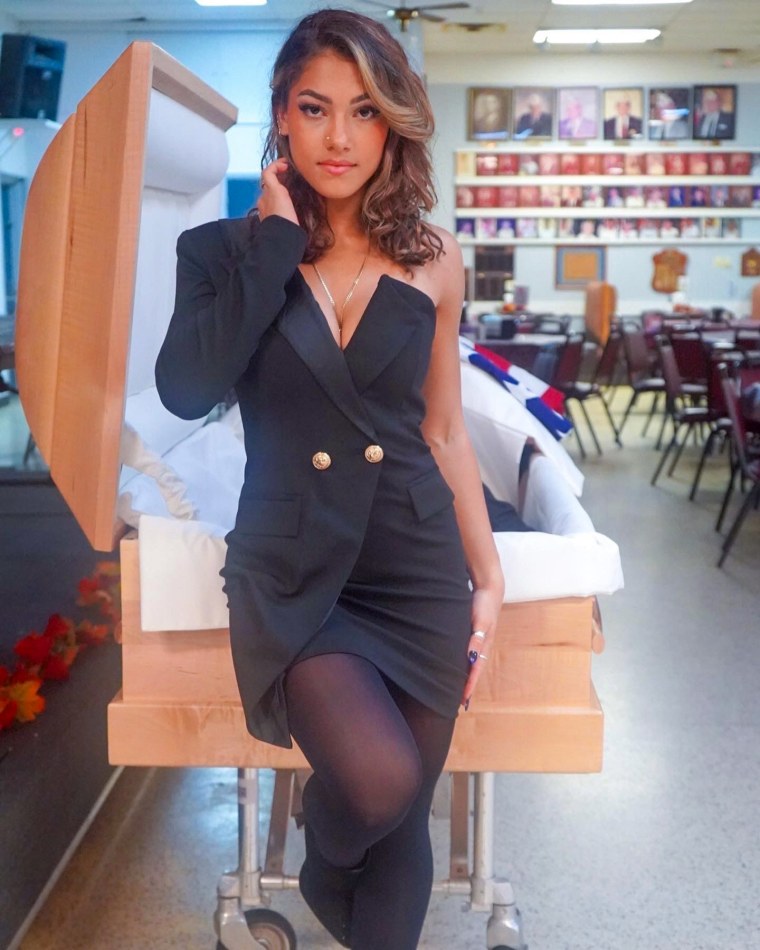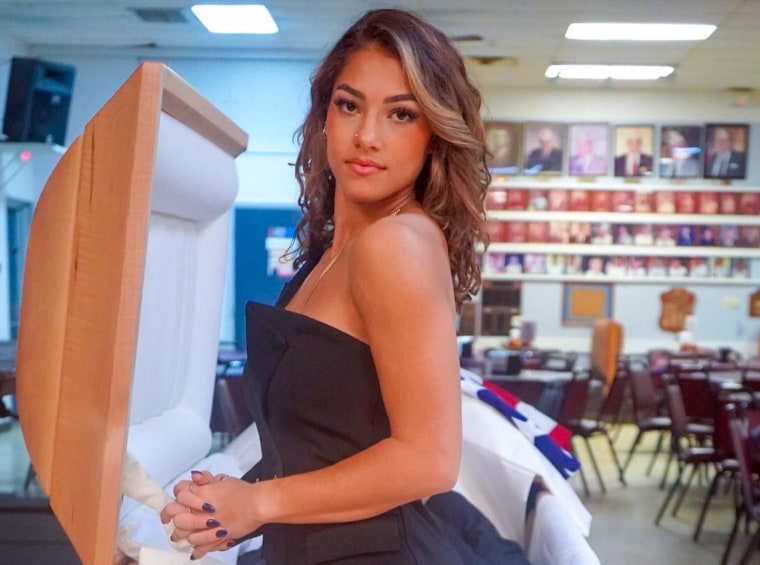Jayne Rivera's Funeral Photoshoot Sparks Backlash | News Now
In an age dominated by social media, where the lines between personal grief and public performance often blur, can we truly understand the motivations behind unconventional displays of mourning? The recent case of Jayne Rivera, a Miami-based influencer, has ignited a fierce debate, forcing us to confront the complex relationship between personal expression and societal expectations, particularly in the context of grief and loss.
The story begins with a series of photographs posted on Instagram, a platform where Rivera, a TikTok star known for her fashion, travel, and swimwear content, has cultivated a significant following. These images, however, were unlike her usual fare. They depicted Rivera, 20, posing in front of her deceased father's open casket. The images, taken at the funeral of her father, Jose Antonio Rivera, a veteran who passed away on October 11th, immediately sparked a firestorm of controversy.
The photos, taken at her father's funeral, showed Rivera in a black dress, posing in various stances. The reaction from the online community was swift and overwhelmingly negative. Many deemed the act disrespectful and inappropriate, leading to a barrage of criticism and accusations of seeking attention.
In response to the backlash, Rivera defended her actions, stating that she viewed the occasion as a celebration of her father's life, as if he were still present. She emphasized that she didn't see anything wrong with her tribute to the army veteran and that her father would not be mad. This defense, however, did little to quell the outrage. Screenshots of the images quickly spread across social media platforms, fueling the debate and amplifying the criticism.
The incident highlights the complex dynamics of social media and the influencer culture. Rivera, who has gained popularity through her posts on fashion, travel, and swimwear, is an American Instagram star and model. Her content typically centers around modeling, swimwear, and lifestyle, often incorporating her interest in fitness. The platform, for better or worse, provides a space for personal expression, which is frequently monetized.
The controversy surrounding Rivera underscores the tension between individual freedom and societal norms, especially when dealing with sensitive topics like death and mourning. While some might argue for the right to express grief in any manner they choose, others contend that certain actions, particularly when publicized, can be perceived as insensitive or even exploitative.
The impact of this incident has been far-reaching, generating discussions about grief, respect, and the role of social media in shaping our perceptions of these deeply personal experiences. The debate encompasses questions about appropriate conduct, the boundaries of personal expression, and the potential for social media to amplify both support and condemnation.
The case also raises questions about the intersection of grief and the performance of self on social media. With platforms like Instagram and TikTok, individuals frequently present curated versions of their lives, aiming for an idealized image. The desire for likes, shares, and followers can sometimes lead to decisions that might be perceived differently if made privately.
Ultimately, the Jayne Rivera case provides a lens through which to examine the evolving landscape of mourning in the digital age. It pushes us to consider whether the rules of decorum are changing in the face of the internet, and if the price of visibility is becoming higher than ever before. The controversy serves as a reminder that even in the realm of personal grief, the court of public opinion can be a harsh and unforgiving judge.
| Category | Details |
|---|---|
| Full Name | Jayne Rivera |
| Age | 20 (at the time of the incident) |
| Residence | Miami, Florida |
| Known For | TikTok star, model, Instagram influencer (fashion, travel, swimwear) |
| Social Media Activity | Active on Instagram, TikTok, OnlyFans |
| Incident | Posted photos posing in front of her father's open casket on Instagram after his funeral. |
| Backlash | Severe criticism and condemnation from the online community, leading to widespread debate about respect, grief, and social media conduct. |
| Defense | Rivera stated she viewed the occasion as a celebration and that her father wouldn't have minded. |
| Father's Name | Jose Antonio Rivera |
| Father's Profession | Veteran |
| Start Date on Social Media | March 17, 2021 (TikTok - see reference) |
| Controversy | Sparked a debate about the intersection of personal grief, social media, and the ethics of online content creation, as well as about the boundaries of personal expression, |
| Reference Website | TikTok profile |
The swiftness with which the story gained traction across platforms such as Twitter and Reddit, demonstrates the publics ever-increasing interest in the interplay between personal and digital realms. Images of the controversial post were circulating widely, highlighting the reach and impact of these platforms when sensitive issues such as grief and loss are involved.
The situation became a prime example of how online content, even when originating from a single source, can spread rapidly, sparking extensive discussion and debate. Critics and supporters alike shared their viewpoints, with some acknowledging the right to self-expression, and others emphasizing the importance of showing proper respect.
A fundamental aspect of the controversy involved the concept of what is appropriate behavior during a time of mourning. In the realm of social media, the lack of regulation frequently allows for a wide variety of expression. This instance, however, brought up questions about where to draw the line between individual freedom and a sense of common decency.
Riveras actions, captured in still photographs, soon became a focus of attention. The decision to share the pictures online raised queries regarding her motivations. Was it simply a way of expressing grief? Or was it, as many critics claimed, an attempt to court attention and gain visibility? The answers, whatever they might be, remain in the eye of the beholder.
The controversy surrounding Rivera also highlights the ethical difficulties content creators frequently face. Influencers and models frequently grapple with the need to create engaging content, which can often be at odds with personal sensibilities. The drive for online visibility may occasionally override concerns about how sensitive subjects should be addressed.
From a cultural perspective, this instance is indicative of a much larger shift in our attitudes towards death and dying. As society becomes more accepting of different forms of expression, established conventions are often challenged. However, the incident serves as a reminder that while expression is crucial, it should still be tempered by respect.
The broader implications of this case extend beyond just the specific incident involving Jayne Rivera. It triggers a reflection on how we grieve and share our experiences with others in the digital age. It urges us to reassess the standards of respect that should still apply, even when using the power of the internet, and the complexities of balancing personal grief and public display.
In the wake of the backlash, Rivera, who also has a presence on OnlyFans, faced a wave of criticism that forced her to confront the consequences of her actions. Her decision, whether justified in her own mind or not, sparked heated debate on a variety of platforms. This situation demonstrated the power of social media to both amplify and condemn individual decisions.
The incident also underlines the potential for misunderstandings and misinterpretations when personal experiences are shared on social media. What Rivera may have viewed as a tribute to her father was perceived by many as disrespectful, demonstrating the nuanced and often subjective nature of online discussions.
Ultimately, the story of Jayne Rivera is more than just a tale of an Instagram post gone wrong. It is a case study on modern-day grief, social media influence, and the challenges inherent in reconciling individual freedom with cultural expectations. It compels us to consider how we want to mourn and, more importantly, how we want the world to perceive our process. The debate continues, reminding us of the complex and ever-evolving nature of public and private life in our digital world.
The discussion about the photographs is also illustrative of how the influencer culture has taken hold in modern society. In a world where content creators constantly seek to build and maintain their online personas, the need to engage with their audience may, at times, intersect with personal values. The choices made in the digital arena can then have very real effects, leading to public criticism and difficult introspection.


